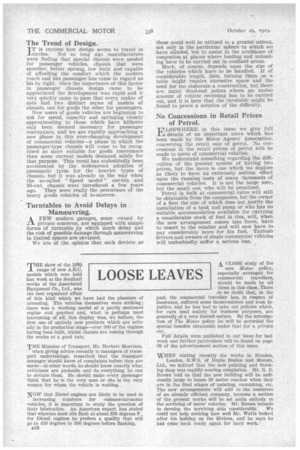Turntables to Avoid Delays in Manceuvring.
Page 80

If you've noticed an error in this article please click here to report it so we can fix it.
A FEW modern garages, some owned by 11. private concerns, are equipped with simple forms of turntable .by which much delay and the risk of possible damage through manceuvring in limited spaces are obviated.
We are of the opinion that such devices as these could well be utilized to a greater extent, not only in the, particular sphere to which we have alluded, but to assist in the avoidance of congestion at places where loading and unloading have to be carried out in confined areas.
Much, of course, depends upon the size of the vehicles which have to be handled. If of considerable length, then, turning them on a table Might require excessive space and the need for too elaborate a construction, but there are many dead-end points where an undue amount of vehicle reversing has to be carried out, and it is here that the turntable might be ,found to prove a solution of the difficulty.
No Concessions. in Retail Prices of Petrol.
LSEWHERE in this issue we give full details of an important move which has been made by the MOtor Agents' Association, concerning the retail sale of petrol. No concessions in the retail prices of petrol will be made to users of commercial vehicles. , We understand something regarding the difficulties of the present system of having two prices, but the move is one which we deplore as likely to have an extremely serious effect upon the running costs of many thousands of commercial vehicles. It is not the large user, but the small one, who will be penalized.
Petrol in bulk at commercial rates will still be obtainable from the companies, but the owner of a fleet the size of which does not justify the installation of a tank and pump or who has no suitable accommodation available for carrying a considerable stock of fuel in tins, will, when the new arrangement comes into force, have to resort to the retailer and will now have to pay considerably more for his fuel. Taxicab drivers and owners of single commercial vehicles will undoubtedly suffer a serious loss.




























































































































































































